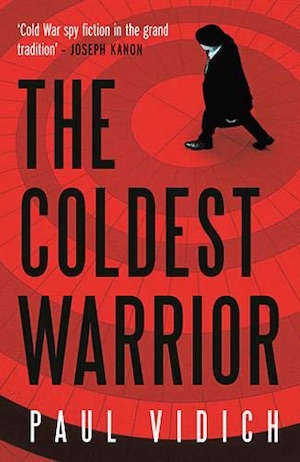Written by Paul Vidich — The boundaries between espionage and crime fiction sometimes can be murky and hard to define, and other times clear as day. The Coldest Warrior is one of those spy novels that has elements that could be taken straight out of a typical mystery novel as it opens with a murder and features a detective of sorts who will go to any length to find out who the killer is, despite risking the ire of his bosses and putting his own life in danger along the way.
The difference between The Coldest Warrior and some other novels reviewed on this site is the identity of the detective. The year is 1975, and CIA agent Jack Gabriel is due to retire, with the effect of the Watergate scandal still being felt throughout Washington, DC. There is more scrutiny than ever on the US secret services. A recent review of illegal CIA activities, under the name of the Rockefeller Commission, has unearthed evidence relating to the 1953 death of Dr Charles Wilson, an American bio-weapons scientist. Wilson was working on LSD, more specifically its uses for American war efforts. While investigating the drug he died after falling out of a ninth-floor window at a Washington hotel. Much about his death remains secret until the commission unearths some inconsistencies in his death – missing documents, a list of people in the room at the time of the doctor’s death that includes people that don’t appear to exist, and disturbing details in the autopsy report that the CIA is eager to brush aside.
For his last action as a serving member of the CIA Gabriel is asked to investigate the death in order to appease Dr Wilson’s family. His boss makes it clear what kind of investigation he expects: one that unearths no dirty secrets in the CIA’s past and does nothing to undermine hard-earned Cold War gains. A whitewash, basically. Gabriel isn’t willing to lie down so easily, and the more he finds out about Dr Wilson’s death, the more he needs to investigate. Gabriel finds he has enemies throughout Washington who want to make sure that the truth never comes out. These enemies run right to the top, including the leadership of the FBI and CIA, and even the president himself.
The Coldest Warrior is based on true events, events which touched the author personally. It’s hard for an outsider to tell just how true the events conveyed in the novel are, but in this age of the NSA being accused of spying on American citizens and accusations of foreign meddling in American elections, nothing feels outside the realms of possibility. It’s scary how true and timely The Coldest Warrior feels. It’s not just for those with an interest in American politics, however, it features as tense a murder mystery as you’d find in the latest Scandinavian crime fiction hit.
Fans of the espionage fiction of John Le Carre or Graham Greene will find a lot to love in The Coldest Warrior, which gives an insight into Washington, DC as the Cold War thawed out in the post-Vietnam War era. The world has changed since then, and I felt several time that the events Vidich writes about couldn’t happen now. But the thing about espionage fiction is that it gives us a window into a secret world, one which most of us have no idea about. This is why The Coldest Warrior is so timely and yet so timeless – it reminds us to keep asking ourselves just what our governments are capable of, and what can be justified. All while telling a compelling and thrilling murder mystery.
For more recent espionage fiction check out Under Occupation by Alan Furst.
No Exit Press
Kindle/Print
£4.31
CFL Rating: 5 Stars
